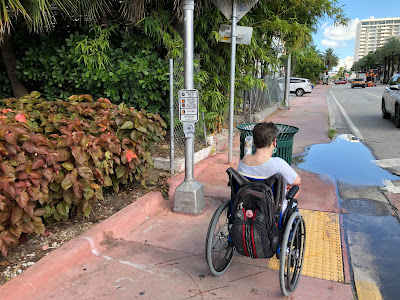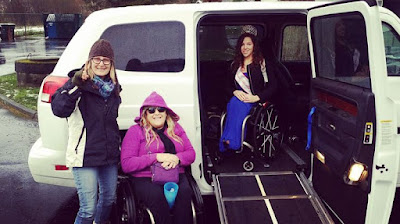JULY 25, 2022 – THE EVE OF THE 32ND
ANNIVERSARY OF THE ADA
We were
honored for creating and team teaching a groundbreaking Universal Design Course
at University of Miami School of Architecture in the Spring semester of 2022.
Thanks to Commissioners
Kirk Menendez and Rhonda Anderson for co-sponsoring the legislation honoring
our hard work. We appreciate Commissioner Menendez’s kind reading of our
accomplishments/bios into the official City Commission meeting record:
Steve
Wright, an award-winning journalist and marketer, and Heidi Johnson-Wright, a
lifelong public servant and Americans with Disabilities Act (ADA) expert, based
the course on their three decades of expertise and advocacy. The 32nd
anniversary of the ADA is tomorrow, July 26 – with a celebration at County
Hall.
Johnson-Wright
has used a wheelchair for mobility for 40 years and brings her practical
experience as well as her 30+ years of professional expertise to the classroom.
Wright is America’s go-to journalist for reporting on architecture, town
planning, mobility engineering and urban policy – as they relate to people with
disabilities and access for all.
The
revolutionary full-credit course for graduate and undergraduate students
reflected UM’s commitment to diversity, equity, inclusion and accessibility for
all.
Universal
Design is extremely relevant because the United Nations has identified more
than one billion people in the world have disabilities. Centers for Disease Control research has
proven that one in four people in the United States will experience some form
of disability.
The Wrights
have published more than 1,000 articles on best practices for planning,
architecture, transportation engineering and urban design for people with disabilities.
They have
lectured at national conferences across the United States and in Europe. This
year, they have combined to appear on more than one dozen podcasts focusing on
better housing, mobility, jobs, parks and quality of life for people with
disabilities.
The Wrights donated
100 percent of their School of Architecture professor pay toward further
outreach and education to support Universal Design on a global scale. Funds
support travel and related expenses supporting pro bono presentations on “design
for all” at major conferences and conventions.


































